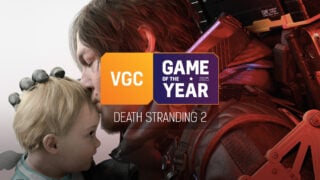BitSummit day three: Māori sci-fi, Jay & Silent Bob and a new NES game
Our final hands-on report from Japan’s leading indie games festival

The third and final day of BitSummit has now ended, bringing this year’s event to a close.
Japan’s leading indie games expo was bigger than ever this year, yet despite this the quality of the games on display was consistently strong.
Not one of the 35-40 games I played over the course of the past three days disappointed me, giving me a whole new list of upcoming indies to keep my eye on.
If you’ve missed it, here’s my BitSummit day one coverage and my BitSummit day two coverage, with hands-on impressions of the games played during those days.
Below is a summary of what I played on the final day, but there’s more coverage to come on VGC in the coming weeks, including VGC’s Game of the Show, developer interviews and a video showing off everything I saw in one easy-to-view format.
Until then, here’s a recap of what I saw on the final day of BitSummit.
Changeable Guardian Estique
It is the Year of Our Lord 2024, and people are still making games for the Nintendo Entertainment System. All is right with the world.
To prove that this isn’t just a modern game designed to look retro, Changeable Guardian Estique’s table at BitSummit had the game running on an original Famicom, through an old CRT television.
It’s a side-scrolling shoot ‘em up in which, as the title suggests, you have the ability to transform your ship between two forms: a spaceship and a mech.
Each form naturally has its own strengths and weaknesses. The mech form is obviously easier to hit, but it can recharge its armour quicker and it doesn’t take damage when it hits a wall, which is useful for tunnel sections.
The game makes good use of the NES hardware, with a decent number of sprites on-screen yet no slowdown that I could see and very minimal flicker (both were something a lot of NES schmups used to struggle with).
I played through three of the game’s six stages and had a fun time with it. A hard mode is apparently planned, too, and with music by Shinichi Sakamoto (Wonder Boy in Monster World) it’s clearly not messing around.
Rhythm Rabbit
It’s funny how sometimes a very simple idea can make for a difficult game. Thankfully in the case of Rhythm Rabbit that difficulty is endearing, not enraging.
You play as a rabbit who has to reach the carrot at the end of each stage. The twist is that the rabbit hops to the beat of the music, whether you want him to or not.
Each time there’s a new beat, the rabbit will hop a random number of spaces (up to four in the demo I played). You’re only shown that number a couple of seconds before the hop, so you have to very quickly figure out which direction to move in.
There may be a river two spaces in front of you. If the game hops you one step forward then tells you it’s going to hop one space again, you have to quickly change course and either hop backwards or to the side, and wait it out until you get a better number.
Because it’s relentless and you don’t get a chance to take a break, even the early stages of Rhythm Rabbit feel action-packed, even though all you’re doing is hopping from space to space.
There’s a free demo on Steam, so you should try it for yourself. You’ll be surprised at how tricky it is, but how well the concept works.
Guardian Maia
Guardian Maia is developed by New Zealand studio Metia Interactive, and is set in a New Zealand in the year 2750 which has been ravaged by a toxin called Grey Death.
Playing as a forest guardian called Maia, you have to travel across Te Waipounamu (South Island) to find three hidden kete (baskets) which can help to save her people.
The studio is led by Māori developers and the game tries to combine sci-fi with indigenous Māori culture, giving it a look and feel that’s pretty unique in the video game space.
The game itself feels solid enough, and Maia is a really interesting, strong protagonist. She also befriends a giant bird thing near the start of the demo and you can ride around on this, smashing into enemies.
I’m curious to find out more about this one, though it did appear to be relatively early and a release date has yet to be confirmed for it. Definitely one to watch.
Bo: Path of the Teal Lotus
Bo was just released a couple of days ago, but because I’ve been in Japan this was my first chance to get my hands on it.
There are approximately seven million Metroidvania games out there now, meaning on paper it should be difficult for Bo: Path of the Teal Lotus to stand out from the rest. And yet, it manages to.
For starters, the game is absolutely gorgeous. The beautiful artwork is reminiscent of games like Ori and the Will of the Wisp, so when I was told that one of the Bo developers was the level designer on that game it made sense.
Although I only spent about 15 minutes with it I also really liked the first technique you earn, which is the ability to add a double jump every time you hit an enemy in the air.
This leads to sections where you have to almost pogo your way up a series of static mid-air targets, using a ‘hit, jump, hit, jump’ method.
It also leads to a brilliant boss battle against a flying enemy where you can take on different strategies – either taking your time and waiting for it to drop to the ground, or heading to the air and trying to continually juggle yourself with a steady stream of hits.
We’ll have more on Bo: Path of the Teal Lotus on VGC once I get the chance to spend some more time with it, because it looks pretty special.
Jay and Silent Bob: Chronic Blunt Punch
This beat ‘em up based on the movies of Kevin Smith was announced more than eight years ago, and finally looks like it’s on the road to completion.
Thankfully, it does appear to have been worth the wait because Chronic Blunt Punch is a visually impressive beat ‘em up with fantastic character art and animations.
Naturally, if you’re a fan of Smiths’ movies and his View Askewniverse then you’ll get more out of it, because there are plenty of in-jokes dotted around and various characters from all the films appear (Dante from Clerks is the first support character you collect, for example).
The game also uses a sort of tag-team mechanic where (at least in single-player mode) you can hit the A button to switch between Jay and Silent Bob whenever you want, with each sporting their own moveset.
As a Kevin Smith fan this is a game I’ve been waiting for for a long time. Much longer than I expected, to be fair. But it really does look like this one’s going to pay off in terms of fan service.
1000 Deaths
This is a really cool one. Developed by Pariah Interactive, which is based in both New York and Mumbai, 1000 Deaths is a platformer where decision-making is key.
You play as a small television set, who travels through a series of worlds each containing a selection of platforming stages.
By completing these stages you’ll unlock decisions, which the TV then has to choose between in order to advance the story in a different direction.
In the demo, for example, we had to make a decision for a weird long-nosed character, who wants to stay in the grim Nowherestown and try to clean it up by becoming the mayor.
His friend wants to leave Nowehrestown behind and head off to Jollywood to become a star, so by completing enough stages you then get the chance to decide whether he’ll stay or go, with your choice affecting which stages and story you encounter next.
It looks like there’s going to be plenty of replay value in this one, given how many forks there are likely to be in the story, as well as the fact that you can earn trophies for speedrunning the stages too.
Block Rancher
Have you ever played Tetris and wondered where the blocks actually come from in the first place? Block Rancher attempts to answer this.
Developed by London-based studio HandCircus, Block Rancher is a sort of hybrid of genres in that it’s part puzzle game and part third-person action roguelike.
As a worker for a big conglomerate, your job is to build meaningless trinkets so they can be bought by the masses. The problem is, you first have to find the materials for these trinkets in the first place.
Heading out into the game world, you have to use your special part-gun part-vacuum to capture the various creatures roaming the land, all of which can be turned into Tetris-like blocks before being sucked up.

Once you collect enough blocks, you can then take them to the construction area where you fire them into a machine then use them to build the trinkets. The more you build within a time limit, the better your builder rank.
It’s a clever idea and a fun game on top of that. It’s going to be fun to see how it expands because it’s already clear it won’t be linear: at one point I spent too long battling a strong bull-like enemy to get a red block instead of stacking up on weaker green blocks, but it’ll be interesting to see how those red blocks are more valuable.
HandCircus founder Simon Oliver was at the game’s booth and according to him the game’s still in the early stages of development, but from what I’ve seen already there’s a lot of promise here.
Exhausted Man
Set to release on July 25, Exhausted Man was a rather fitting game for me to end with, given the combination of a three-day expo and Kyoto’s constant 35+ degree heat.
Developed by Beijing studio Candleman Games, it’s a comedic physics-based game where you control a man (or woman) who’s so tired they’re constantly lying down.
You drag their head around by moving the left stick, and by holding down the face buttons too you can drag individual limbs.
Each stage gives you different tasks, such as grabbing items, pulling yourself up a certain height and the like. As you complete tasks you have to add more items to the stage, giving your more obstacles to navigate next time.
On paper this may sound like a frustrating game – anyone who’s played Octodad will know that a game where you control all the limbs of a floppy person can often end in rage.
Exhausted Man is a lot more lenient than games of that ilk, however, and even by the end of my short play session it was clear that it’s a more approachable take on this type of game.
That’s a wrap on our daily roundups for BitSummit.
Check out our day one coverage and day two coverage if you haven’t already, and keep an eye out for more features from the show in the coming days.
















